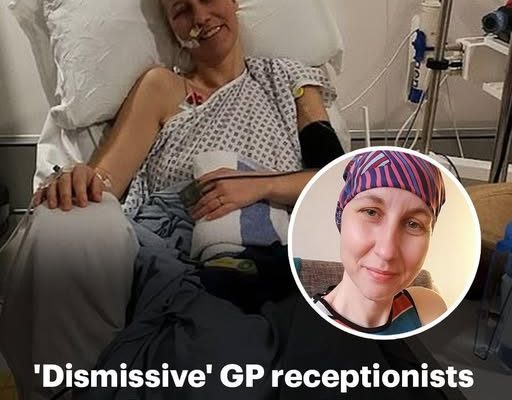In early 2022, Sibylle Schwarz, a German software developer who resides in the town of Leyland, Lancashire, did not hesitate when she thought she had a normal cold.
She believed that one of her children, a small daughter and a newborn son, had contracted the nursery bug.
She had faith that her symptoms would ultimately go away, but as they continued for several months, she began to worry about them seriously.
The 40-year-old parent discovered that her cough was not a winter cold but rather a sign of something much more serious—she had oesophageal cancer and had six to twelve months to live—nearly a year after she initially became ill.

Only after battling past two GP receptionists who refused to take her seriously did Ms. Schwarz learn of her diagnosis.
Despite her inability to swallow, the receptionist was contemptuous on the first visit, refusing to schedule an appointment and simply sent her to the pharmacy to pick up anti-sickness pills.
When Ms. Schwarz returned two weeks later, she was told to just return to the drugstore, which made her plead for a visit with her general practitioner.
It took an additional four months for the mother-of-two to have the necessary test after a string of additional delays, at which point it was determined that she had one of the least curable malignancies.
She said: “I went back to the GP in June and there was a different receptionist. But she also said to go to the pharmacy. I told her I really, really needed to see a doctor and she booked me in for an appointment.”
“The GP talked to me a little bit and then agreed to send me to have an endoscopy, just to be sure.”
“She put me down on a waiting list and I got a call from that department two months later because I wasn’t listed as urgent.”
“But by that point, I already couldn’t swallow food.”
Ms. Schwarz was unable to be sedated for an endoscopy since she was still nursing her infant boy. As a result, the procedure—which entails inserting a camera inside the body for internal analysis—was postponed until the end of October.
“I lost 25 kilos within those four months,” she recalled. “I was in a very bad state. I couldn’t eat. I was losing my hair. My iron level was very, very low.”
“The surgeon told me they wouldn’t have put me down for an endoscopy if I hadn’t lost so much weight. They didn’t believe me when I said I couldn’t eat any food.”
“Then after the endoscopy, the surgeon apologised for being so presumptuous and told me the news that I had cancer. She discovered it was quite advanced, and that I might have only six to 12 months to live.”
What once looked like a winter cold had turned into a diagnosis for one of the least survivable of all cancers. She said: “I didn’t know that the cough was a symptom.”
Opportunities for early detection are routinely lost because oesophageal cancer symptoms, such as a persistent cough, are so general and ambiguous that they are commonly confused with heartburn or other stomach problems.
Patients may suffer greatly as a result. Regretfully, fewer than 20% of UK patients with oesophageal cancer will live for more than five years.
According to Digestive Cancers Europe data analyzed by Action Against Heartburn during Oesophageal Cancer Awareness Month, the UK has more cases of the condition than the majority of Europe.
According to data, the UK has 14.2 instances of esophageal cancer per 100,000 persons, compared to 3.5 in Italy, 4.4 in Spain, 7.0 in France, and 7.7 in Germany.
Among all malignancies, it has one of the lowest survival rates.
Ms. Schwarz described how she felt when she received her diagnosis: “I was just completely shocked.”
Diagnosed a day before her daughter’s seventh birthday, she added, “The first thought I had was that I would not see her turning eight.”
Ms. Schwarz said, “My father died of pancreatic cancer. So, I had heard about that, and how dangerous it is. And I knew that there are different kinds of cancer but I had not heard of oesophagus cancer.”
“Of course, as soon as I came home, I Googled it and saw that it’s quite bad.”
As soon as her tumor was discovered, she was expedited for scans due to the severity of her situation.
Six weeks after receiving her diagnosis, she underwent four rounds of chemotherapy to reduce the growth in order to get ready for surgery.
But in a heartbreaking turn, Ms. Schwarz’s treatment was not working: “Unfortunately, the chemotherapy wasn’t really helpful.”
She explained, “It did shrink the tumor in the beginning, and I could eat a little bit, but then it just grew again. I needed a feeding tube, and I couldn’t even swallow water anymore.”
“The surgeon had an appointment with me and discussed all the outcomes of the scans. She was very pessimistic and said she was unsure if she could take it out through surgery.”
“I said, ‘If you can’t, then just close me up again, and that’s fine. I want you to try. I’d rather die than not try.’ And she did, and luckily, she could take it all out.”
After a surgery that was deemed unsuccessful, Ms. Schwarz is adjusting to life more than two years after being told she might only have six months to live. She even got married in December 2022, just two months after receiving her diagnosis.
She said, “I feel fine now,” explaining, “I can eat most things again, smaller portions, of course, but I have energy. I can take care of my kids.”
“I’m turning 40 this year. It’s in the middle of half term so maybe I will go away for a week or something.”
After her ordeal, the Lancashire woman is just grateful for every day: “Yesterday, I had a talk with someone, and he asked me, What is your five-year plan?” As a cancer patient, you don’t really like to think ahead so far.
“In five years, my son will be eight, my daughter, oh God, will be in the middle of puberty. It would be great if life would just not change, just everything stays as it is, everybody will be healthy.”
“During treatment, I only thought about my kids. My daughter had already gone through a lot.”
“We had a bit of a rough start in her life and then we moved from Germany to Lancashire so she lost all her friends. I didn’t want her to lose her mother, too. I was always thinking about that.”
“And then, of course, there was my son, who was only a baby and was a very, very great sunshine in my life. They helped me to survive.”
Since oesophageal cancer is not as well-known as other forms, Ms. Schwarz hoped her tale would encourage people to seek treatment as soon as possible.
Her advice to fellow patients? “Certainly push a bit more.”
She said, “You always have to be the bad patient and you always have to push. I was never that person. I always waited my turn.”
“Of course, you have to be polite, but you have to push and advocate for yourself. And if I would have known that, then that might have led to me being diagnosed faster.”
The parent is endlessly thankful to the surgeon who saved her: “I am very grateful to my surgeon.”
Ms. Schwarz added, “Even though she was pessimistic and not convinced that she could help, she did listen to me at the end and more importantly her skills and determination saved my life.”
“I will never stop thanking her for that.”
In August 2023, the software engineer launched a monthly cancer support group.
She commented in a post on a local Facebook group advertising the meet-ups: “I am not a charity, NHS or other official organization. I just want to offer a safe space for everybody who needs it.”



